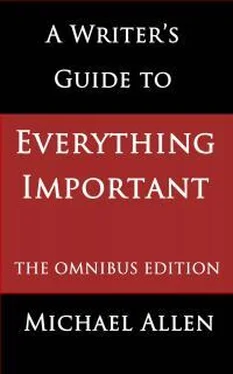And off you went. And you bought the radio, or the suitcase, or the widget, for, let us say, seven pounds. Which was the cost. And you duly brought it back and presented it to Mrs Thingummy, and after a bit of umming and ahing she would insist, absolutely insist, my dear boy, on paying you for it.
‘Now I demand to know,’ she would say, smiling happily, ‘precisely how much it cost, and I will repay you every penny.’ And she groped for her handbag and chequebook.
And then would follow a possibly quite prolonged sparring match, during which you, the purchaser, would assert most vociferously that the widget had really not been very expensive, and you would much rather she took it as a gift.
After which, the rancidly rich Mrs Thingummy would demand in louder and louder terms that you must, you absolutely must be reimbursed. And eventually, with great reluctance, you would admit that you had a receipt on you somewhere, now where was it, possibly it was upstairs in your other suit.
And Mrs Thingummy would say no, she was not going to insult you by asking for a receipt, that would be most offensive to a gentleman of your class.
And finally, after a further show of reluctance, you would allow a sum of money to be thrust into your hands. And that sum was always cost plus. The purchase of the widget had cost you seven pounds, but the price you quoted to Mrs Thingummy, and the sum that you received from her, could be seven pounds plus, let us say, two. Or five. Or even thirteen, if the circumstances permitted.
Hell’s teeth, Ernest had once bought a car for Mrs Armindale, and even after giving a generous cut to the salesman who provided the fraudulent papers, he had cleared enough to live on for six months. But that, of course, had led to the incident in which he had had to hit her and hit her and hit her, which was another matter altogether and one which he would much rather forget, so he didn’t burden Mr Murgatroyd, the Company Secretary of Granborough Electrics, with any part of it.
However, as a result of all those experiences, Ernest Marshwood understood the concept of cost-plus. He understood it very well indeed.
‘Ah,’ he said wonderingly. ‘I see!’
‘Yes!’ Murgatroyd was now practically wetting himself with excitement.
‘Well,’ said Ernest, ‘I think that you and I, Mr Murgatroyd, are going to have to put our heads together. You see, it is my belief that this company has been seriously underpricing its products for many years past.’
Murgatroyd nodded vigorously. As well he might: all thoughts of redundancy, of a jobless future and a pensionless retirement, were rapidly disappearing over the horizon.
‘We have been forced by the extremely competitive situation brought about by the slump of the early years of this decade to price our products at a level well below the true economic cost of production,’ said Ernest.
‘Absolutely true,’ Murgatroyd agreed.
‘We have, for example, been forced to ignore maintenance of the plant and equipment.’
‘Yes, yes!’
‘We have laid off workers. Imposed pay cuts. Waived dividends on the shares. We have cut corners and ignored research. Why, those who did not know the most difficult circumstances in which we were working might well have accused us of negligence and incompetence!’
‘They could have, they could, they could!’ sang Murgatroyd.
‘All of that is going to have to end immediately.’
‘Immediately!’
‘It is essential to the war effort, essential to the well-being, nay the very survival of the nation, that this company should produce high-quality products with the very best materials, so that the motors we send out to fit into the tanks that our brave lads are going to drive against the enemy will be reliable, will function efficiently and effectively, and will be a credit to us all.’
‘Credit to us all. That will be our motto.’
Ernest pointed at Murgatroyd with the stem of his pipe. ‘You, Mr Murgatroyd, will sit down today and work out the true cost of producing the best quality electric motors that this plant is capable of. A truly economic cost. One that fully reflects all the factors that go into the motor’s production. That will be our stated cost, one which can be fully justified of course, and that will be the figure on which the cost-plus element is based.’
Ernest paused and puffed smoke for a few moments reflectively.
‘Why,’ he said, ‘it wouldn’t surprise me, Mr Murgatroyd, if the true cost of our electric motors proved to be a figure some two or three times greater than that which we have hitherto been charging.’
‘You’re quite right,’ said Murgatroyd. ‘That kind of figure wouldn’t surprise me either, Mr Marshwood.’
Yes, thought Ernest, war was a shocking and terrible business. But, in this instance, it was clearly going to be a lot more terrible for some people than for others.
***
Reminder: This extract from Topp Family Secrets is told from the main-character, third-person point of view, with minimal author comment.
This novel is available in Kindle ebook format.
APPENDIX 4:
How Young Albert Escaped from the 500 Harem Girls
Michael Allen
There’s a bloke down our pub – name of Bernard – who reckons he’s got a time machine in his shed. If you buy him a pint, he’ll tell you about places he’s been to in it. And some of them are really weird.
Course, there’s other blokes who reckon that Bernard’s just making these stories up, so that blokes like me will buy him pints. But I’m not so sure. I’ve been and had a look at his shed. He keeps it locked, naturally, because they’d nick anything round here – but he’s definitely got something in there. It’s got dials and that. You can see it through the window.
Like I say, not everyone believes what Bernard says, and I once heard a bloke with red hair tell Bernard to his face that there’s no such thing as a time machine. But Bernard wasn’t having any.
‘Listen, smart-arse,’ he said. ‘If H.G. Wells could build a time machine in 1895, there’s no reason on earth why the Japanese can’t build one today. They just take a little while to catch up with western technology, that’s all. And as a matter of fact it isn’t just a time machine. It’s a time and space machine. It can visit parallel universes.’
Well, this bloke with red hair never said a word after that, because he didn’t know what a parallel universe was. I don’t either, of course. But Bernard’s mum told my mum that Bernard has a GCSE in physics, and he uses a computer at work, so I reckon he knows what he’s talking about.
‘This machine I’ve got is made by Sony,’ Bernard said. ‘I’m beta-testing it for them.’
Well, this bloke with red hair looked dead impressed when Bernard said he was beta-testing this machine. Because this bloke didn’t know what beta-testing meant. I don’t either, of course.
‘Yes,’ said Bernard. ‘It’s all very interesting really. I reckon it’ll transform society, once it becomes generally available. Bit like the internet. And of course I can go to all sorts of interesting times and places in it. Watch the French Revolution, visit Queen Cleopatra. All sorts. I had a really interesting experience just last night, as a matter of fact.’
‘Oh yes?’ said the bloke with red hair, who had stopped not believing in time travel. ‘Where did you go to?’
Bernard pushed his empty glass towards this bloke. ‘Buy us a pint,’ he said, ‘and I’ll tell you.’
Well, the bloke with red hair said sorry, but he’d run out of money, so I bought Bernard a pint instead. And this is the story he told us.
I thought it would be nice to go somewhere warm (said Bernard), seeing as how it’s so bloody cold here at the moment. So I sat down, and I dialled in a random choice of parallel universe, plus the factors warm, sunny, and lots of beautiful girls. I pressed the button, and after the usual two-minute whirring noises, there I was.
Читать дальше












